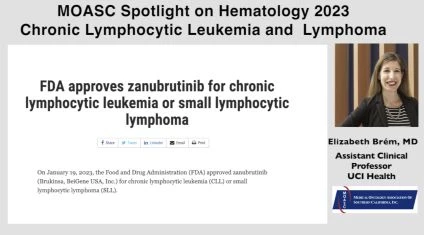Zanubrutinib compared to ibrutinib in chronic lymphocytic leukemia
By Elizabeth Brém, MD from UCI Health
We focused basically on two major as abstracts from ASH this year. One of which was a late breaking abstract called the Aspen Study, which was Zanubrutinib versus Ibrutinib in treatment of CLL, which showed a progression-free survival benefit for Zanubrutinib, and actually led to a recent FDA approval for Zanubrutinib for treatment of CLL.
And we also talked about the triangle study, which had been presented at the plenary, looking at whether or not we should incorporate Ibrutinib into our standard of care therapy for mantle cell lymphoma. And perhaps if by doing that, we could potentially avoid autologous transplant for con for consolidation for patients with mantle self.
What stood out to you most about these presentations?
I think the Zanubrutinib one is kind of practice affirming. I think that most of us have kind of moved to the newer BTK inhibitors for many indications, not just CLL. So it is nice to have another option and to have that approval for CLL for triangle, for mantle cell.
I think we’re starting to see challenges in the paradigm for mantle cell lymphoma for years. Induction therapy autologous transplant. And I think it’s good that as we get newer agents like BTK inhibitors, we’re taking a step back and going, okay, where do we incorporate them? And if we incorporate these agents, do we still need some of these other therapies like autologous transplants?
Some other studies have tried to look at if we’re using a BTK inhibitor, for example, do we still need high dose cytarabine? Something like being admitted for high dose cine or autologous transplant, that’s a really big deal for the patient. So taking those things potentially out of the treatment algorithm could be huge for the patients.
Watch and Share the Video with Slides Here: https://oncologytube.com/v/41747
What are your hopes for this research?
Disease based in treatment for the future. So I think we’re gonna see in general, I feel like across the board we’re just seeing less and less traditional cytotoxic chemotherapy. When I talked about TRIANGLE, one of the things I mentioned was they used a relatively intensive chemotherapy alternating D-HAP with R-CHOP.
Many of us use in Nordic regimen, alternating high dose cytarabine with R-CHOP. And again, those are kind of a big deal, especially the Ara-C containing regimens. So could we use less chemotherapy, less intensive chemotherapy? No chemotherapy if we kind of do thoughtful combinations. And I think that as we get more small molecules by specific antibodies, cellular therapies, I think we’re just gonna see less and less cytotoxic chemotherapy, really across the board for all the diseases we treat.
Is there anything you would like to highlight to your peers about this research?
Well, I guess I wanna highlight some of what we have going on at UC Irvine right now. So we now have, in addition to a number of cellular therapies on clinical trials, we do now have access to standard of care CAR T-cell for diffuse large B-cell lymphoma, follicular and mantal cell lymphoma. We also have a number of bispecific antibodies, both on clinical trial, and we recently got our first FDA approval of a bispecific antibody for follicular lymphoma.
Elizabeth Brém, MD – About The Author, Credentials, and Affiliations
Elizabeth Brém, MD is a hematologist-oncologist and medical oncologist at UCI Health who specializes in the detection and treatment of lymphoma and other hematopoietic cancers.
She received her magna cum laude in medicine from the University at Buffalo Jacobs School of Medicine and Biomedical Sciences in Buffalo, New York. She subsequently completed a residency in internal medicine and a fellowship in hematology-oncology at Beth Israel Deaconess Medical Center in Boston, where she was a clinical fellow at Harvard Medical School. In Boston, she also completed research training in the lab of Dr. Anthony Letai at the Dana-Farber Cancer Institute, focusing on the Bcl-2 family of proteins and its role as a therapeutic target and source of drug resistance in lymphomas.
Dr. Brém is a member of the American Society of Hematology, the Lymphoma Working Group of the Southwest Oncology Group, and the University of California Hematologic Malignancies Consortium. Her objective is to create and perform innovative clinical studies for lymphoma patients.

